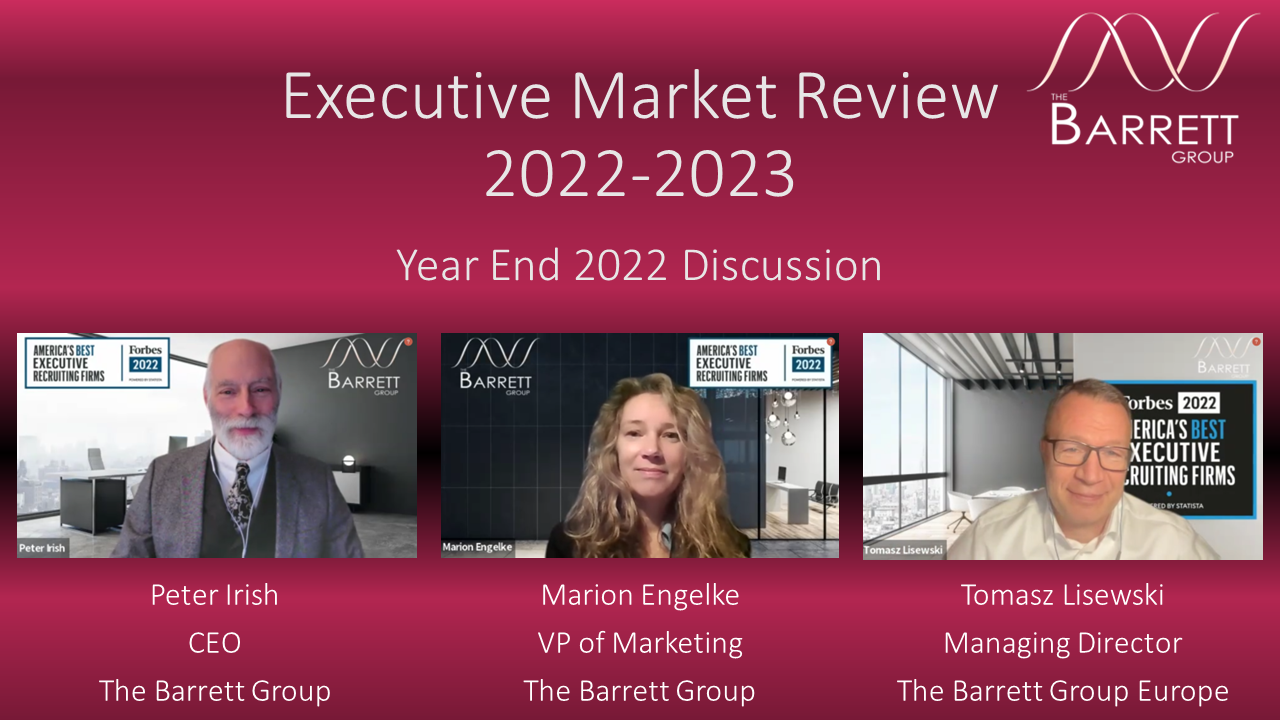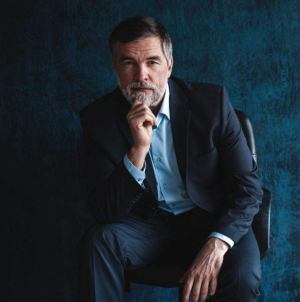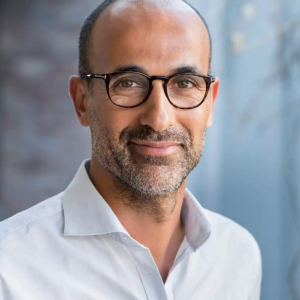
Executive Market Review 2022-23
The Barrett Group’s VP of Marketing, Marion Engelke, interviews Peter Irish, CEO of The Barrett Group and Tomasz Lisewski, Managing Director of The Barrett Group Europe on the Executive Market in 2022 and 2023.
Hello. I am Marion Engelke, vice president at the Barrett Group and I would like to welcome you to this year’s review of the market for executives. Where has the market been? Where is it now? And where is it headed?
Peter, how would you answer these questions?
Peter Irish: As you know Marion, we follow a population of about 8.5 million executives in the US, Europe, the UK, and the Middle East. They cover mainly the C-level titles as well as Vice Presidents, General Counsels, Chairpeople, and other senior executives in practically all industries. This group grew by about 1% in 2022 according to LinkedIn, adding approximately 85,000 new senior positions. But even more importantly some 318,000 execs changed jobs for one reason or another. Some 400,000 executive positions were created or exchanged in the past year.
That seems like a lot of activity. Tomasz, how about Europe, the UK and the Middle East? How much of this action was in your part of the world?
Tomasz Lisewski: It’s similar, however it’s a mixed bag when we looked at specific industries. Aviation, Hospitality, traditional automotive, branded consumer goods and very recently the big tech are struggling and are more focused on restructuring. While IT, Management Consulting, Financial Services, Health Care, Energy and Renewables and retail / ecommerce are growing and still hiring executives. That’s also the strength of TBG, helping our clients to transition to growing industries.
Peter, in the US was this demand for executives also specific to certain industries or geographies?
Peter Irish: Our client teams approach this subject like surgeons—targeting very specific cities, industry segments, and companies. But to speak more generally, certainly there were areas that experienced higher demand such as IT, Management Consulting, Financial Services, Health Care, and Banking to name just the tip of the ice berg.
And are we out of the woods yet, Peter, macroeconomically, for example?
Peter Irish: No, Marion. We are not. As everyone knows, inflation has spiked and interest rates are rising. But what many may have missed is that in the mean time it seems inflation may also have peaked and begun to fall. See the latest information from Germany or the US. In fact, while central banks are likely to still raise rates somewhat, major banks such as Morgan Stanley, Barclays, Deutsche Bank, and UBS are now predicting that rates will start to fall again by the end of 2023 or early 2024. Meanwhile, Private Equity is sitting on dry powder to the tune of $1.4 trillion or more and will undoubtedly continue to invest—creating new executive positions in growing industries.
Tomasz, one of the impacts of the pandemic is the rise in remote working. How has this affected executive opportunities from your perspective?
Tomasz Lisewski: Thanks to the pandemic, companies became more flexible on remote / commuting basis. That gives executives the opportunity to target broader geographies across whole continents whether it’s Europe or Middle East or America. That also plays to the Barrett Group strength, because most of our competition is focused on their local markets e.g. German firms on Germany, American firms on the US and so on. Whereas our team works across America, Europe and Middle East.
Peter, how effective has the Barrett Group been through the crises and recovery and new crises we have just discussed?
Peter Irish: Crisis always spawns opportunity, Marion, if you know where to look for it. The vast majority of our clients utilize our unique methods developed over three decades in business to discover positions in the unpublished market. Opportunities so new they have not yet been announced. We have seen hundreds of clients land in the past year—more than one a day so far—and helped our clients land about 700 executive interviews. That’s why Forbes magazine cites us as one of the best in the business.
Can you be more specific?
Peter Irish: Certainly, how much time have you got? Seriously, we publish clients’ success data every week on our Hiring Line webpage—something unique in the industry. Well, Joel Engle landed recently as Chief Growth Officer, for example. Or I might point to other recent clients successes in the Private Equity portfolio company area. For example…
- Healthcare – Operating Partner
- Food & Beverage – Chief Information Officer
- Financial Services – Senior Vice President
- Real Estate Investment – Managing Director
- Biotech – Executive Director
Is it fair to say that many of these clients actively want to change industries? How can the Barrett Group help clients transition from one industry or role to another? Tomasz?
Tomasz Lisewski: Career change is actually what we specialize in, because traditional recruiters and HR, who work on profile matching, cannot help in those situations. That’s why we focus on the unpublished market, supporting our executive clients to position them with decision makers, who can better understand the potential value-add beyond their last industry. That’s how 75% of our executive clients are landing. One great example is Ray Cleary, a client who moved from Insurance to aviation and is now GM for a major airline’s fleet operations.
Peter, where would you see the biggest growth areas going forward?
Peter Irish: We have highlighted hydrogen, alternative energy, and more generally the infrastructure area as being a focus not only for public investment—such as EV charging stations—but especially Private Equity. The US, Europe, and India to name just a few regions each plan to spend 500 billion dollars or euros in the form of grants, subsidies and tax breaks over the coming years to retool their energy infrastructure away from fossil fuels. Private Equity is piling in too, so that the demand for executives is likely to be very broad.
Some of those projects will take years to execute. When is the best time to start a career change, Peter?
Peter Irish: Executives confuse growth for demand some times. As we mentioned, even industries with low growth can have high demand for executive talent as incumbents retire and/or decide to leave the industry. More than 318,000 senior executive positions changed hands in the past year in territories that we monitor. The unpublished market is always in motion if you know how to access it.
Tomasz, do you have anything to add?
Tomasz Lisewski: January and Q1 are the best time to start because this is when new budgets becoming available, some execs catch their bonuses and leave and companies start to fill those vacant positions. That’s why it’d be better to start as soon as possible not to miss out on your dream job.
Well, that all sounds quite encouraging to executives who may be considering a career change. Thank you both for your perspectives.
This is Marion Engelke signing off for the Barrett Group and wishing all of our viewers a very healthy, happy, and successful new year!
Also read: Predicting Your Future












